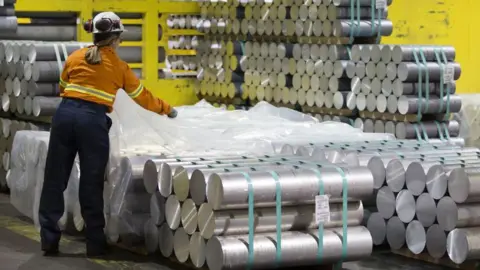Business reporter
 BBC
BBCMade in Canada.
Three words that are now a common presence on Canadian shelves, after Donald Trump’s tariffs sparked a trade war with the US’s northern neighbour.
In Canada the economic measures against it have been met with a wave of patriotism, with some consumers and businesses boycotting American products.
Others with operations in the US face a choice – ride out the uncertainty or bring their enterprise back home.
“Right now, I’m a little angry. I don’t want to invest in American companies,” says Joanna Goodman, owner of Au Lit Fine Linens, a Toronto-based bedding and nightwear company.
“It’s about having your eggs in one basket. And right now, that basket is very reckless and very precarious,” she continues.
On a tour around one of her firm’s two stores, housed in a giant warehouse, Ms Goodman highlights elegantly made-up beds, mannequins in silk pyjamas, and shelves full of sweet-smelling candles – most of it made in Canada.
But one fifth of the stock currently comes from the US. Ms Goodman is quick to point out, “you see how big the store is, so even 20% is a lot”.
“I have a lot of inventory here of American brands that I’ve had relationships with for 20 years. I’m not going to throw it away,” she says. “The question is, will I reorder?”
To show Au Lit Fine Linens’ commitment to Canadian manufacturers, its stores now highlight everything that is Canadian made. This is mirrored on its website, which has a “shop all made in Canada” section, and says “made right here at home”.
From Houthi attacks in the Red Sea, to the Ukraine war, global events in recent years have given rise to a more recent phenomenon – reshoring.
Bringing business operations back to home shores, it is the reversal of offshoring.
Business leader and recently-appointed new member of Canada’s Senate, Sandra Pupatello, says that reshoring is “really obvious” to support.
Pupatello, who had previously been Ontario’s Minister of Economic Development and Trade, points to the Covid-19 pandemic, when rules of trade “went right out the window”.
She specifically cites the example of US mask manufacturer 3M coming under pressure from the White House in 2020 to halt exports to Canada and Latin America.
In that moment Pupatello thought: “We’ve got to be prepared for the worst”.
Shortly after, she established Reshoring Canada, a non-partisan group advocating for a more resilient supply chain in Canada.
Pupatello tells the BBC: “If the going gets tough, Canada is on its own. And if we know that’s the case, let us plan for it.”
 Getty Images
Getty ImagesA Canadian government report from last year found that there had “not been signs of either large-scale or any notable increased reshoring by businesses”, but things could now be changing.
Ray Brougham has been trying to make inroads into the Canadian car manufacturing sector since establishing his company Rainhouse Manufacturing Canada in 2001. Based in British Columbia, it manufactures parts for a number of industries.
The North American car industry’s integrated supply chains can see parts crossing the borders between the US, Mexico, and Canada multiple times before a vehicle is finally assembled.
US President Donald Trump said he would temporarily spare US carmakers from a new 25% import tax imposed on Canada and Mexico, just a day after the tariffs came into effect in March.
But in the shadow of a trade war, Mr Brougham says he has had “good communications” with a large Canadian auto parts company for the first time ever. “All of a sudden they are interested in working closer with other Canadian companies.”
For Mr Brougham and others, the benefits of reshoring are clear. From giving a leg up to small companies that have struggled to compete with manufacturers overseas, to ensuring fair wages, and the environmental benefits of importing and exporting fewer goods.
Others, including Graham Markham, director of a food sector supplier, believe it’s about adding value to products Canada already produces.
His Canadian firm New Protein International is currently constructing Canada’s first soy protein manufacturing plant in southwest Ontario, just miles from the US border.
Canada is the world’s fourth-largest exporter of the crop, but most of it is processed overseas.
“We don’t process those value-added ingredients into more valuable ingredients here at home,” says Mr Markham.
From critical minerals and uranium to lumber and soybeans, he argues that this is the moment to change.
“Canada has long been a successful supplier of raw materials to the world. The opportunity now is to stop exporting the job creation and innovation that comes from processing those materials domestically.”
 New Protein International
New Protein InternationalSo, could manufacturing start coming back to Canada? Economist Randall Bartlett says it is too early to tell.
“There’s a lot more smoke than there is fire when it comes to actual reorganisation of supply chains and moving them domestically,” says Mr Bartlett, senior director of Canadian economics at Quebec-based Desjardins.
“I think there has been some movement toward reshoring, but I think there’s a lot more narrative around it than there is actual re-establishing of manufacturing capacity.”
There are major hurdles too.
The highly-integrated auto industry, for example, would take years to untangle. Reshoring it would require “many tens of hundreds of billions of dollars in both private and public sector investment to make happen”, according to Mr Bartlett.
Then there’s the reality of global trade.
“Some countries are better at producing some things than other countries are,” Mr Bartlett says, suggesting that rather than a full reshoring push, diversifying Canada’s trade partners might be more practical.
He says that Canada should focus on “those industries where we have a comparative advantage”, which he says include renewable energy and processing steel and aluminium. Those two metals have now been hit with a 25% tariff if they are exported to the US.
Back at Au Lit Fine Linens in Toronto, Joanna Goodman steps into a vast stockroom, filled with the sound of carboard boxes being packed.
“We’re shipping orders to the US that came in pre-tariffs,” she explains, before pausing. “We did get an order the day of the tariffs starting, and it was a very decent-sized order.”
She says that she doesn’t know whether the US buyer understands that tariffs will now apply. “He has to ask Mr Trump [why]”.
As for what comes next? “These tariffs could be gone any day. Let’s see how it all unfolds, then we’ll start making decisions,” says Ms Goodman.
Like many Canadian businesses, she’s waiting for the dust to settle before deciding where to buy, where to sell, and what Made in Canada really means for the future.



